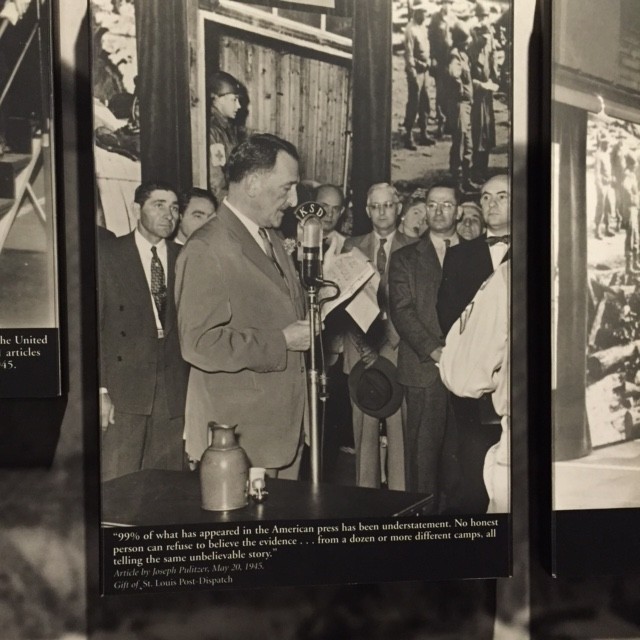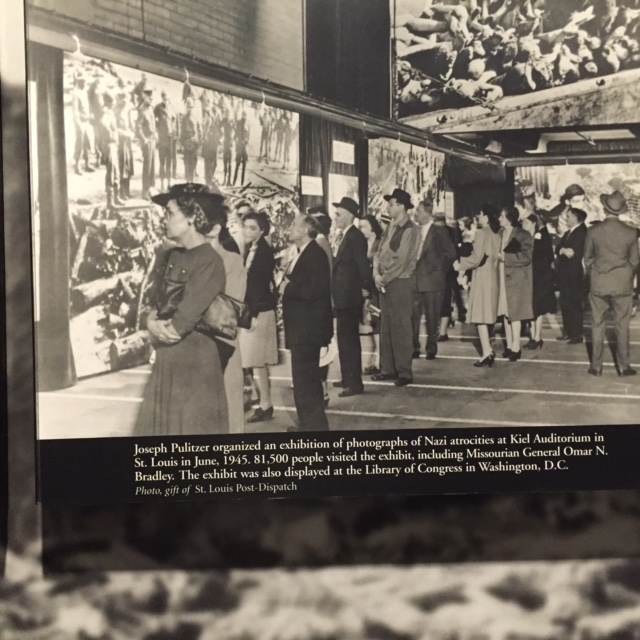
It was 70 years ago that Joseph Pulitzer, editor of the St. Louis Post-Dispatch, reported from Europe that the holocaust was far worse than the American public had been told. He came back to Missouri to launch an information project to disclose the extent of the Nazi atrocities.
He was stunned to view the two German death camps that he visited – Buchenwald and Dachau. “The brutal fiendishness of these operations defies description,” he wrote.
At the time, Pulitzer was revered as one of the best newspaper editors in the nation. The St. Louis Post-Dispatch earned nine Pulitzer Prizes during his 44-year tenure as publisher and editor. He was the son of the famous Joseph Pulitzer who had founded the Post-Dispatch in 1878 and also the Pulitzer Prizes in journalism.
This second Pulitzer was one of 18 editors from newspapers and magazines who were invited by Gen. Dwight D. Eisenhower to view the evidence of the death camps. He said that before going he was aware of the controversy that existed between those decrying the killing of Jewish citizens and those who called it just propaganda and denied that Germany could have done something so horrible.
But after viewing the camps and seeing the corpses, Pulitzer in a bylined dispatch to the paper, said: “It is my grim duty to report that the descriptions of the horrors of the camp (Buchenwald), one of many which have been and will be uncovered by the Allied Armies, have given less than the whole truth…. They have been far worse than previously reported.”
He was there for two weeks, just after World War II ended, and wrote several articles which were later compiled in a book called “A Report to the American People.” He called Adolf Hitler “This miserable freak of nature who came to power in 1933 ,” but said “the members of the German General Staff are the guiltiest of all the war criminals….they should be be properly tried and when found guilty, be sentenced and shot.” When they are “under the sod the prospects for World War III will be substantially reduced.”
He also blamed the Gestapo, S.S., industrialists and financiers. He said the majority of the German population had to know what was going on. Intellectuals and democratic advocates were also targeted. The goals of the Nazi regime were to overpower other states and their populations and to exterminate anti-fascist opponents, he said.
“More than 7,500,000 men, women and children died of abuse or were killed outright; most died in some 100 concentration camps,” he reported. He quoted an official in Antwerp as saying: “Hitler didn’t create Germany. Germany created Hitler.”
Pulitzer was so obsessed with describing this dark chapter of history that he knew what he must do. He launched an information campaign that included U.S. Army Signal Corps films and large photos of the atrocities. They were shown at public places in St. Louis and elsewhere such as libraries, banks, large businesses, Kiel Auditorium and other venues. He discussed the mass killings on local radio stations. Pulitzer even spoke in Washington and before the Missouri Legislature in Jefferson City. Transcripts were made available to schools and more than 50,000 persons who saw the exhibits were given pamphlets documenting the atrocities.
One of Pulitzer’s goals was to put an end to the denials. He said people who refuse to believe what happened “should go to their doctors to have their heads examined and also their hearts.”
Author’s note: Roy Malone is a retired reporter from the Post-Dispatch.


